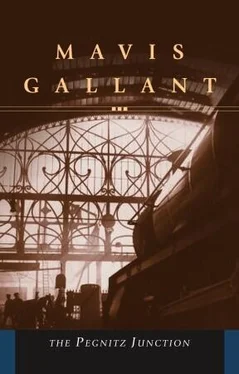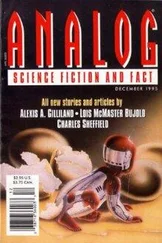On a January afternoon, Ernst the civilian wears a nylon shirt, a suede tie, a blazer with plastic buttons, and cuffless trousers so tapered and short that when he sits down they slide to his calf. His brown military boots — unsuccessfully camouflaged for civilian life with black Kiwi — make him seem anchored. These are French clothes, and, all but the boots, look as if they had been run up quickly and economically by a little girl. Willi, who borrowed the clothes for Ernst, was unable to find shoes his size, but is pleased, on the whole, with the results of his scrounging. It is understood (by Willi) that when Ernst is back in Germany and earning money, he will either pay for the shirt, tie, blazer, and trousers or else return them by parcel post. Ernst will do neither. He has already forgotten the clothes were borrowed in Willi’s name. He will forget he lived in Willi’s room. If he does remember, if a climate one day brings back a January in Paris, he will simply weep. His debts and obligations dissolve in his tears. Ernst’s warm tears, his good health, and his poor memory are what keep him afloat.
In an inside pocket of the borrowed jacket are the papers that show he is not a deserter. His separation from the Foreign Legion is legal. For reasons not plain this afternoon, his life is an endless leave without the hope and the dread of return to the barracks. He is now like any man who has begged for a divorce and was shocked when it was granted. The document has it that he is Ernst Zimmermann, born in 1927, in Mainz. If he were to lose that paper, he would not expect any normal policeman to accept his word of honour. He is not likely to forget his own name, but he could, if cornered, forget the connection between an uncertified name and himself. Fortunately, his identification is given substance by a round purple stamp on which one can read Préfecture de Police . Clipped to the certificate is a second-class railway ticket to Stuttgart, where useful Willi has a brother-in-law in the building trade. Willi has written that Ernst is out of the Legion, and needs a job, and is not a deserter. The brother-in-law is rich enough to be jovial; he answers that even if Ernst is a deserter he will take him on. This letter perplexes Ernst. What use are papers if the first person you deal with as a civilian does not ask to see even copies of them? What is Ernst, if his papers mean nothing? He knows his name and his category (ex-Legionnaire) but not much more. He does not know if he is German or Austrian. His mother was Austrian and his stepfather was German. He was born before Austria became Germany, but when he was taken prisoner by the Americans in April, 1945, Austria and Germany were one. Austrians are not allowed to join the Foreign Legion. If he were Austrian now and tried to live in Austria, he might be in serious trouble. Was he German or Austrian in September, 1945, when he became a Legionnaire because the food was better on their side of the prison camp? His mother is Austrian, but he has chosen the stepfather; he is German. He looks at the railway posters with which Willi has decorated the room, and in a resolution that must bear a date (January 28, 1963) he decides, My Country. A new patriotism, drained from the Legion, flows over a field of daffodils, the casino at Baden-Baden, a gingerbread house, part of the harbor at Hamburg, and a couple of sea gulls.
Actually, there may be misstatements in his papers. Only his mother, if she is still living, and still cares, could make the essential corrections. He was really born in the Voralberg in 1929. When he joined the Legion, he said he was eighteen, for there were advantages in both error and accuracy then; prisoners under eighteen received double food rations, but prisoners who joined the Foreign Legion thought it was the fastest way home. Ernst is either thirty-four or thirty-six. He pledged his loyalty to official papers years ago — to officers, to the Legion, to stamped and formally attested facts. It is an attested fact that he was born in Mainz. Mainz is a place he passed through once, in a locked freight car, when he was being transported to France with a convoy of prisoners. He does not know why the Americans who took him prisoner in Germany sent him to France. Willi says to this day that the Americans sold their prisoners at one thousand five hundred francs a head, but Ernst finds such suppositions taxing. During one of the long, inexplicable halts on the mysterious voyage, where arrival and travelling were equally dreaded, another lad in man’s uniform, standing crushed against Ernst, said, “We’re in Mainz.” “Well?” “Mainz is finished. There’s nothing left.” “How do you know? We can’t see out,” said Ernst. “There is nothing left anywhere for us,” said the boy. “My father says this is the Apocalypse.” What an idiot, Ernst felt; but later on, when he was asked where he came from, he said, without hesitating, and without remembering why, “Mainz.”
Ernst is leaving Paris tomorrow morning. He will take the Métro to the Gare de l’Est at an hour when the café windows are fogged with the steam of rinsed floors. The Métro quais will smell of disinfectant and cigarette butts. Willi will probably carry his duffelbag and provide him with bread and chocolate to eat on the train. He is leaving before he is deported. He has no domicile and no profession; he is a vagabond without a home (his home was the Legion) and without a trade (his trade was the Legion, too). Some ex-Legionnaires have come out of it well. András is a masseur, Thomas a car washer, Carlo lives with a prostitute, Dietrich is a night watchman, Vieko has a scholarship and is attending courses in French civilization, Piotr is seen with a smart interior decorator, Lothar is engaged to marry a serious French girl. Ernst has nothing, not even his pension. He waited for the pension, but now he has given up. He is not bitter but feels ill-used. Also, he thinks he looks peculiar. He has not been to Germany since he was carried through Mainz eighteen years ago, and he is wearing civilian clothes as normal dress for the first time since he was seven years old.
His Austrian mother was desperately poor even after she married his stepfather, and when Ernst put on his Hitler Youth uniform at seven, it meant, mostly, a great saving in clothes. He has been in uniform ever since. His uniforms have not been lucky. He has always been part of a defeated army. He has fought for Germany and for France and, according to what he has been told each time, for civilization.
He wore civilian clothes for one day, years ago, when he was confirmed, and then again when he was sixteen and a Werewolf, but those were not normal occasions. When he was confirmed a Christian, and created a Werewolf, he felt disguised and curiously concealed. He is disguised and foreign to himself today, looking out of Willi’s window at the sky and the cobbles and the neighbours in the court. He looks shabby and unemployed, like the pictures of men in German street crowds before the Hitler time.
It is quite dark when the little boy, holding his mother’s hand with one hand and a cone with roasted chestnuts in the other, enters the court. The mother pushes the heavy doors that hide the court from the street, and the pair enter slowly, as if they had tramped a long way in heavy snow. They have returned safely, once again, from their afternoon stroll in the Jardin des Tuileries. The chestnuts were bought from the old Algerian beside the pond near the Place de la Concorde. The smoke of the blue charcoal fire was darker than the sky, and the smell of chestnuts burning is more pungent than their taste. In a cone of newspaper (a quarter-page of France-Soir) they warm the heart and hand.
Four days ago Ernst followed these two. They live up above Willi’s room. He was curious to know where they were going. The walk came to nothing. When the boy and his mother reached the object of their outing — the old man, the chestnuts, the frozen pond — they turned around and came away, between the black, stripped trees and the cold statues Ernst thinks of as trees. Mercury is a tree; the Rape of Deidamia is another tree. They skirted a sea of feeding pigeons, out of which rose a brave old maniac of a woman with a cotton scarf on her head. It is an illegal act to scatter crumbs for the birds of Paris, but on this Siberian day the guardians of the peace are too frozen to act. The mother, the child, and Ernst behind them, plod on snow like sifted sugar, past the Roman emperors, past the straw-covered beds of earth. In great peril they cross the Quai des Tuileries. The traffic light changes from green to red without warning when they are half over, and they stand still, creating a whirlpool. Along the Pont Royal the wind strikes like an enemy, from every direction at once. After a sunless day there is a pale orange cloud on the Gare d’Orsay. The spires of Notre-Dame and the stalled buses in the traffic block on the Pont du Carousel appear nacreous and white, as if in moonlight. The mother and child are engulfed and nearly trampled suddenly by released civil servants running away from their offices behind the Gare d’Orsay. They run as if there were lions behind them. It has never been as cold as this in Paris. Breath is visible; Ernst’s emerges from marble lungs. The mother and child face the last hazard of the journey — the Quai Anatole France. Even when they have the green light in their favour, they are caught by cars turning right off the Pont Royal. There are two policemen here to protect them, and there are traffic lights to be obeyed, but every person and every thing is submerged by the dark and the cold and the torrent of motorcars and a fear like a fear of lions.
Читать дальше












